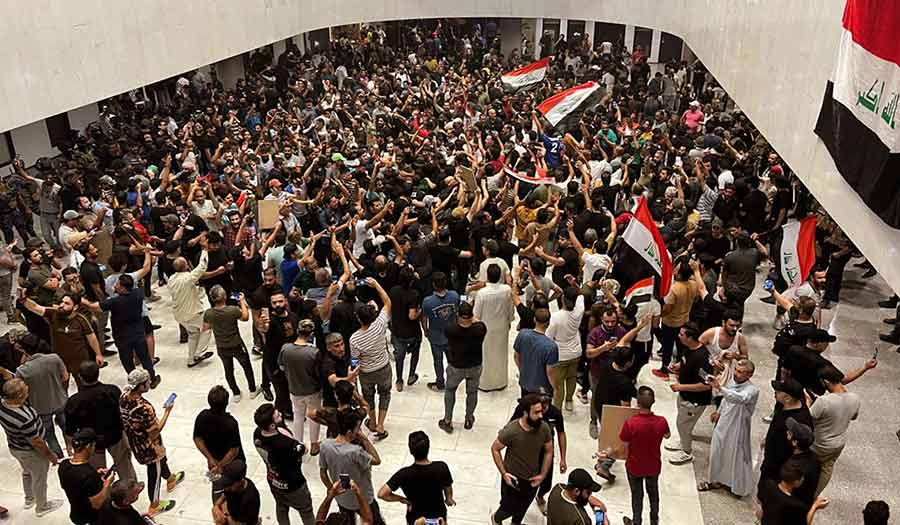 AP/Ali Abdul Hassan
AP/Ali Abdul Hassan
World News Desk
Learn the why behind the headlines.
Subscribe to the Real Truth for FREE news and analysis.
Subscribe NowBAGHDAD (AP) – The followers of the influential populist Shia cleric came by the thousands to storm Iraq’s parliament. Just as quickly, the protesters dispersed at his command.
Mass mobilization and control is a well-worn strategy of Muqtada al-Sadr, a mercurial figure who has emerged as a powerful force in Iraq’s cutthroat political scene with a nationalist, anti-Iran agenda.
Wednesday’s storming of parliament came after al-Sadr’s Tehran-backed political rival, former Prime Minister Nouri al-Maliki, nominated a pro-Iran politician to be Iraq’s new leader.
A look at how Iraq got to this point.
What Led to the Political Paralysis?
Nearly 10 months after national elections were held, Iraq has been unable to form a new government. That is the longest period since the 2003 U.S. invasion that reset the political order.
The lingering impasse has immobilized the already-fragile state, with no clear path out. Iran, meanwhile, is working behind the scenes to stitch together a fragmented Shia Muslim elite, with the potential to disturb the delicate political balance with the U.S. and usher in a new era of inter-sectarian violence.
That paralysis—driven largely by the personal vendettas of elites—has converted Iraq’s political system into a high-stakes chess game with destabilizing consequences. Ordinary Iraqis have no choice but to watch.
Wednesday’s protest was meant as a cautionary message to al-Sadr’s adversaries that he cannot be ignored while they try to form a government without him.
What Moves Have These Powerful Players Made?
Both al-Sadr and al-Maliki are powerful in their own right.
Although al-Sadr’s alliance won the most seats in October’s parliamentary election, squabbling political parties failed to reach the two-thirds majority needed to pick a president—an important step before the prime minister can be selected.
After the negotiations bogged down, al-Sadr withdrew his bloc from parliament and announced he was exiting talks on forming a government.
Able to summon his followers seemingly at the flick of a finger, al-Sadr can bring the country to a standstill. Expectations of street protests swirled in the capital of Baghdad since he quit the talks.
Al-Maliki heads the Coordination Framework alliance, a group led by Shia Iran-backed parties. With their chief impediment gone, the Framework replaced al-Sadr’s resigned MPs. Although the move was legal, it was also provocative, giving the Framework the majority needed in parliament.
On Monday, the alliance announced Mohammed al-Sudani, Iraq’s former labor and social affairs minister, as its candidate for prime minister. He is seen by al-Sadr loyalists as a figure through whom al-Maliki can exert control.
Al-Maliki had wanted the premier post himself, but audio recordings were leaked in which he purportedly cursed and criticized al-Sadr and even his own Shia allies. That effectively sank his candidacy.
What Role Does Religious Fervor Play?
In galvanizing his followers, al-Sadr harnessed the anger over al-Sudani’s nomination as well as rising religious fervor ahead of the important Muslim holiday of Ashura. It marks the killing of the Prophet Muhammed’s grandson, Imam Hussein, and Shias typically march by the thousands to commemorate the holiday, with emotions running high in the days leading up to it.
Wednesday’s protest in parliament was unique for another reason: Riot police did not intervene, and there was little violence.
Toby Dodge, an associate fellow at Chatham House, saw this as a sign that neither side wants any escalating bloodshed.
“There were three big messages: This is theater, there was no violence yesterday and that is deliberate on both sides,” Mr. Dodge said. “This is a fight within the elite; it has nothing to do with the rest of society. This elite lost its legitimacy across society.”
Even if the al-Maliki and al-Sadr camps are able to sort out their differences, there is a third big player in Iraqi politics: the Kurds.
The two main Kurdish parties—the KDP and the PUK—also are deeply divided. They would first need to agree on a candidate for Iraq’s presidency. The KDP had previously allied with al-Sadr, while the PUK belongs to al-Maliki’s Framework faction.
How Might the Battles Continue Outside Parliament?
Neither the al-Sadr nor the al-Maliki factions can afford to be excluded from the political process, because both have much to lose.
Both sides have civil servants entrenched in Iraq’s state institutions, deployed to do their bidding when circumstances require by halting decision-making and creating bureaucratic obstructions.
By the time his eight-year tenure as prime minister ended in 2014, al-Maliki built an omnipresent deep state by installing civil servants in key institutions, including the judiciary. Meanwhile, al-Sadr planted a parallel deep state with key appointments that peaked in 2018.
Because of this, the Framework knows that even without a presence in parliament, al-Sadr will wield significant power within the state, as well as on the street, if al-Maliki’s supporters choose to move forward without the cleric’s agreement.
Both sides have also lost some popular support following massive protests in 2019 against the government that were put down by security forces that left 600 dead and thousands wounded.
That impact was clear in the October 2021 election. Despite winning the largest share of seats, al-Sadr’s vote totals were several thousand fewer than previous balloting. Turnout was only 43 percent.
What Is the Iranian Role?
Despite the consequences, the Framework has signaled its readiness to move ahead with the formation of a government. Lawmaker Mohammed Sadoun, a member of the Framework, described Wednesday’s protest as an attempted coup but said it would not deter the alliance’s efforts.
“We will not allow it. We are involved in the process of forming a government and we have sufficient numbers to elect the president and vote for the next government,” he said.
Communication and messaging from the alliance shows it is preparing for instability.
“They don’t expect the streets to be quiet, and they are preparing for that,” said Hamdi al-Malik, an Associate Fellow with the Washington Institute.
The fairly quick nomination of al-Sudani is a testament to Iran’s efforts to bring together the Shia parties in the alliance. It marked a dramatic turnaround since the election, when Iranian-backed parties lost two-thirds of their seats.
Esmail Ghaani, commander of Iran’s paramilitary Quds Force, which is part of the Revolutionary Guard and answerable only to Supreme Leader Ayatollah Ali Khamenei, has made numerous trips to Baghdad in recent months.
His mission has been to help the parties stay united and agree on a premier candidate, according to officials close to the negotiations who spoke on condition of anonymity to talk about the discussions.
Ghaani was in the capital during Wednesday’s protests and urged faction leaders not to provoke al-Sadr, according to one of the officials.
- World News Desk
- ECONOMY & PERSONAL FINANCE
 From Grain to Gasoline: A Brief World History of Rationing
From Grain to Gasoline: A Brief World History of Rationing
More on Related Topics:
- U.S. Military Pier for Carrying Aid to Gaza Will Be Dismantled After Weather and Security Problems
- The Taliban’s Morality Police Are Contributing to a Climate of Fear Among Afghans, UN Says
- Israel vs. Iran – Insights and Aftermath
- The Leader of Lebanon’s Hezbollah Militant Group Warns Archenemy Israel Against Wider War
- In Northern Gaza, Starved Families Survive on Bread Alone


